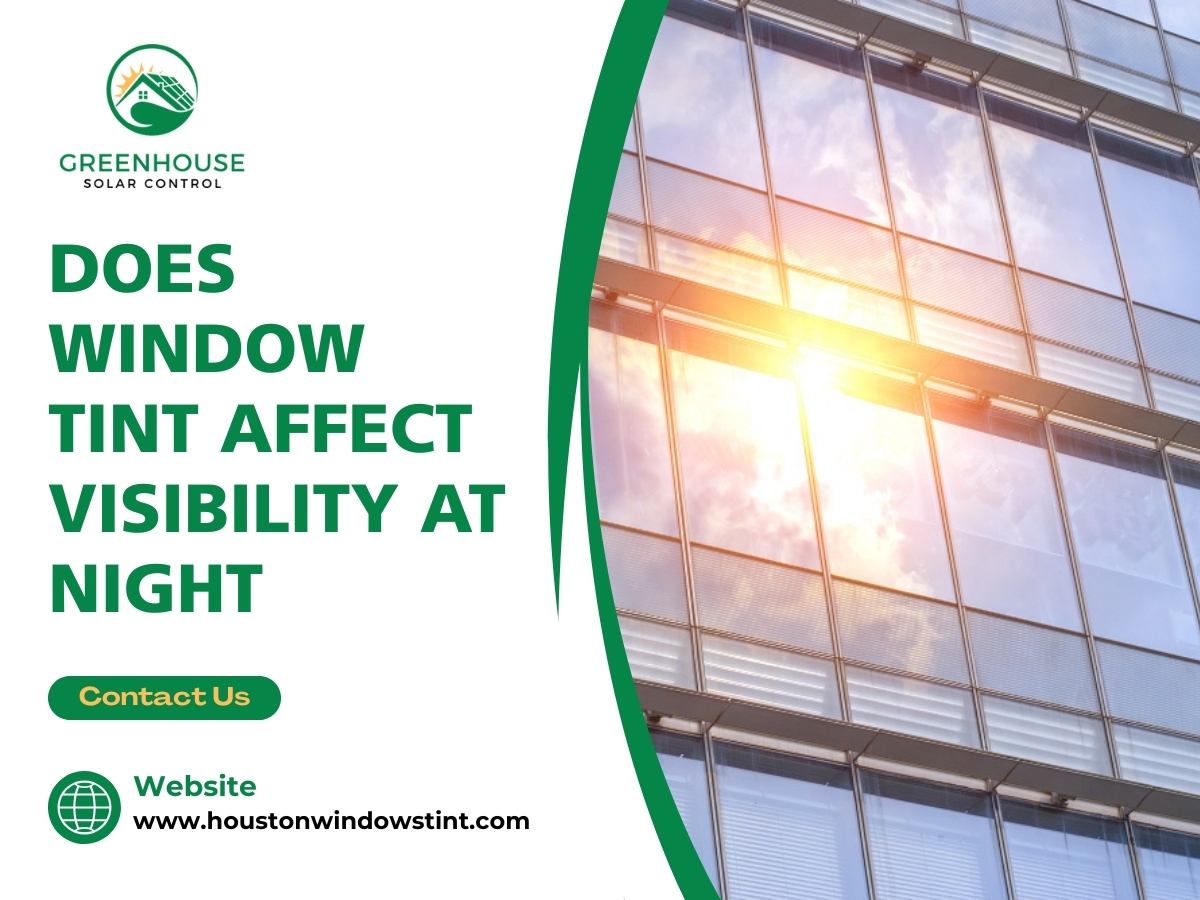
Many people love window tint. It keeps out heat, protects your skin, and makes your car or home look clean and modern. But one big question comes up all the time:
Does window tint affect visibility at night?
The short answer is yes, it can—but not always in a bad way. The type of tint you choose, how dark it is, and how well it is installed all play a big part in how well you can see after the sun goes down.
At Greenhouse Solar Control in Houston, TX, we install window films every day. So we know what helps and what hurts visibility. In this blog, we will explain how tint affects night vision, which tints work best at night, and how to choose a film that keeps you safe and comfortable.
At night, your eyes have to work harder. There is less light outside, and your pupils open wider so you can see. Any window tinting, even light tint, reduces the amount of light coming through the glass.
This means two things:
But the type of tint also matters. Some films block heat without blocking much light, and these are great for nighttime visibility.
Window tint can change night vision in a few simple ways. Let’s look at each one.
All tint blocks some visible light. This is measured by VLT (Visible Light Transmission).
At night, low VLT tint can make it harder to see roads, sidewalks, or obstacles. In homes, it can make porches, driveways, or yards look darker.
This is actually a good thing. Many people think tint only makes things darker, but it also cuts glare from:
Glare can make night driving stressful. A good tint reduces the harsh brightness while still keeping your view clear.
Not all tint is the same. The film material affects night visibility a lot. Here’s a simple breakdown:
At Greenhouse Solar Control, we use high-quality films that stay clear and safe at night.
It can, but it depends on the tint level. Here is what most people experience:
This kind of tint is often too dark for safe night driving.
Most legal front-window tints fall in this range.
Texas has strict rules for window tint on vehicles. Why? To keep drivers safe at night.
In Texas:
When you choose legal tint, you lower your risk and keep visibility strong.
Greenhouse Solar Control always follows Texas state laws, so your tint looks great and stays compliant.
Most people think about cars when they think of tint. But homes and offices also use window film every day. Tint can impact nighttime visibility indoors too, but in different ways.
From inside your house at night, you may notice:
This is normal for almost all window films.
Window film gives great daytime privacy because the sun is brighter outside than the light inside your home. But at night, when your interior lights are on, privacy is reduced.
If night privacy is a top concern, dual-reflective or frosted films may help.
Cheap tint often looks cloudy or hazy—this is the worst possible issue for night vision. It can scatter light and make everything look blurry. This is very unsafe for driving and frustrating for homeowners.
High-quality tint from Greenhouse Solar Control solves these problems because:
Quality matters a lot more than people think.
If you want good visibility at night, here are the best options:
At Greenhouse Solar Control, we help you choose the right tint for your needs and your lifestyle.
Here are simple tips anyone can follow:
A good tint should make your life easier, not harder.
So, does window tint affect visibility at night? Yes, it can. But the right tint keeps your view clear and safe.
Dark, low-quality tint can hurt visibility. High-quality, well-installed tint can actually reduce glare, improve comfort, and keep your windows clear at night.
At Greenhouse Solar Control in Houston, TX, we help our customers choose the perfect window film for day and night use. Whether it’s your car, home, or office, we offer tint that protects, cools, and still gives you a sharp view after dark.
Contact Houston Window Tinting today for a free quote or consultation. We’ll help you find the best tint for heat control, comfort, and nighttime safety.